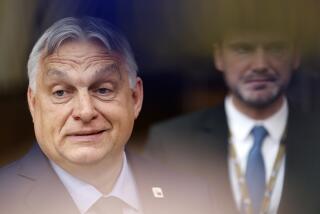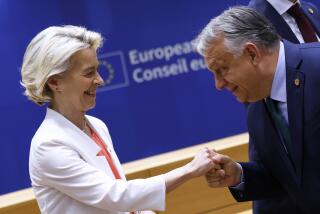Reformer to Head Hungary’s Communist Party
- Share via
BUDAPEST, Hungary — This country’s reform Communists won a decisive battle against conservatives Saturday when the party, in an unprecedented move, named prominent economist and reformer Rezso Nyers as the new Communist Party chairman and appointed a four-man team to steer party politics until the next Communist congress in October, Hungarian Radio reported.
The decision effectively strips General Secretary Karoly Grosz, 58, of much of his power and places Hungary’s leadership in the hands of a reform-minded majority that says it wants to transform Hungary into a socialist democracy.
Grosz, who was hailed as a reformer as recently as 13 months ago when he took power from longtime Communist leader Janos Kadar, has come under increasing criticism in recent months as a fumbling centrist who lacks the vision to steer Hungary into the future.
A Communist Party spokesman said that Grosz would retain the title of general secretary until the party congress, now set for Oct. 7, but that the party will be run by Grosz, Nyers, reformist Premier Miklos Nemeth, 42, and Minister of State and Politburo member Imre Pozsgay, 55.
The ‘Hungarian Gorbachev’
Pozsgay is called the “Hungarian Gorbachev” by some and is the country’s most popular and closely watched reform politician. He is currently consolidating support from both party members and opposition groups and is widely expected to make his move for Hungary’s leadership in October.
Nyers, 65, who pioneered Hungary’s first economic reforms in the late 1960s but was ousted from the Politburo in 1973 for advocating rapid change, is enjoying a comeback today that is rare among East Bloc politicians. He was renamed to the Politburo in May, 1988, when Grosz took office as part of the progressive wind that also swept Pozsgay into his Politburo seat.
Nyers assumes an honorary position created for Janos Kadar when he was deposed as general secretary, but the reinstated reformer has told the Hungarian press that he intends to play more than just a ceremonial role, although it is not clear how much power he will actually have. The post has been empty since the Politburo stripped Kadar, now 77 and in ailing health, of that title last month.
On Saturday, the party also announced that hard-liner Janos Berecz, a former Communist Party secretary for ideology and propaganda, would head an institute for political science that has not yet been founded. This announcement, along with the others made on Hungarian Radio on Saturday, indicate that Hungary’s reformers have won a battle against hard-liners during a protracted Central Committee meeting that started Friday morning and continued into Saturday night.
Opposition party leaders hailed the news.
“I hope that with the leadership of Pozsgay and Nyers, a new party can be born,” said Gabor Demszky, a leader of the Alliance of Free Democrats.
Hungary has made great strides toward economic and political reform in the past 13 months, but critics say Grosz has not kept pace and has in fact angered many Hungarians by his contradictory and often unclear comments.
The general secretary has also been unable to resolve a growing and now openly admitted rift between party progressives and more orthodox Communists.
Reform Communists, who are looking ahead to multi-party elections that could be held by the end of this year, say they must consolidate their numbers and gain the upper hand in the party’s leadership if they hope to win public support at the polls.
While leading Communists hesitate to criticize Grosz by name, Hungarian Parliament Speaker Matyas Szuros said Thursday: “A politician who is inconsistent and makes contradictory statements discredits himself. . . . We have to prepare for the congress with a leadership whose members are at least in solidarity with one another and act in harmony.”
Rumors that Grosz would resign have abounded for several months. They were fueled last week when Grosz failed to appear at a meeting with opposition groups who are working with the Communists to hammer out new property and election legislation that will then be given to the National Assembly, or Parliament, to approve.
Instead, the Communist delegation was chaired by Pozsgay. Nyers and Pozsgay have also gained high marks for attending the ceremony honoring former Hungarian Premier Imre Nagy, who was given a patriot’s burial June 16 after being executed as a traitor for his role in the 1956 uprising.
Grosz, as leader of the Communist Party, was pointedly excluded from the ceremony by its organizers. He had further angered many by his remarks about the Communist Party’s attitude toward Nagy, who is now officially recognized as having been executed after a show trial.
More to Read
Sign up for Essential California
The most important California stories and recommendations in your inbox every morning.
You may occasionally receive promotional content from the Los Angeles Times.










